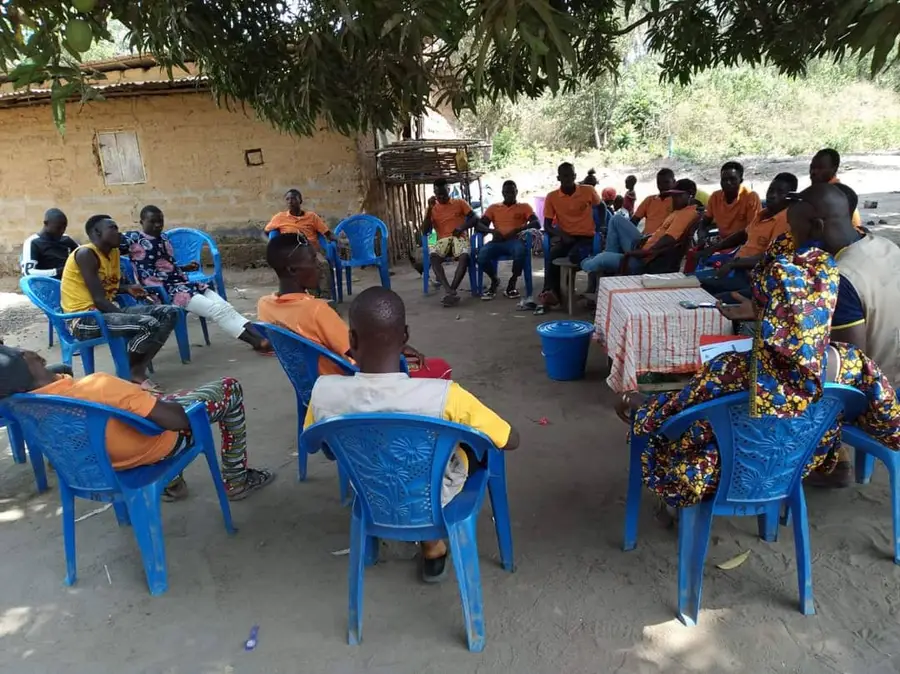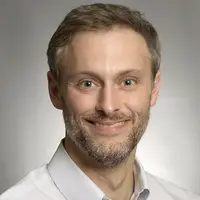
A community action group organizes a community dialogue in Benty, Guinea. Photo by USAID StopPalu+ project
Despite continued progress against malaria, Guinea faces challenges related to local governance that can at times hinder access to essential prevention and treatment services.
For instance, in Mankountan, a town in the Boké region of Western Guinea, the health center was charging patients for malaria diagnostics and treatment, despite those services being free. The local community action group jumped to action by organizing a meeting with health center leaders – as a result, the health center committed to reviewing their pricing procedures and explaining billing to clients, while the community action group agreed to educate the community about the services available at the health center.
Thanks to the involvement of the community action group, the health center was able to address patients’ concerns and ensure the continued provision of essential malaria services for the community.
What Are Community Action Groups and Why Are They Important?
A community action group supports citizens, health providers, and elected leaders to work together to identify service gaps, correct community misperceptions about health services, and advocate for infrastructure and financing improvements to local governments. Community action groups include a wide range of members who support community mobilization, such as the social mobilizer of the health and hygiene committee, the head of the health facility, women’s or youth community-based organizations, religious leaders, local elected officials, teachers, and local child protection committees.
By bringing together these important stakeholders and training them to use social audits, develop community action plans, mobilize communities to implement plans, and report actions to local authorities, community action groups have been a critical facet of RTI’s support to Guinea’s health system. We have led this work since 2007 with funding from the U.S. President's Malaria Initiative through USAID Faison Ensemble, USAID StopPalu, and USAID Stop Palu+.
Community action groups have two goals. First, they support community education on disease prevention, and second, they engage with health facility and local leaders to address community health priorities. They can accomplish these goals because their members sit at the intersection of communities, facilities, and local government, and are able to bridge the divide between these groups. These groups can help solve health challenges in Guinea because high community trust, in the presence of relatively unresponsive government services, provides opportunities for community representatives to extend the reach of health messaging beyond health centers, while also influencing how the government provides health services.
How Community Action Groups Address Health Service Delivery Gaps
Community dialogues are a powerful way for community action groups to identify challenges that hinder high quality health services. For example, in Kindia, community dialogues identified that the Sori Woula health post was not operational because the head of the health post worked in his private clinic and not in the health post. As a result of the community dialogue, community action group members agreed to contact the health district to replace the head of the post and ask them to nominate a backup health worker in case the head of the post was unavailable.
We are very grateful for the construction of this health post. But what is a health center without a caregiver? The head of the post can go several days without setting foot there.” — President, Sori Woula District
Community action groups can also get more creative in their solutions to ensure that health facilities have the resources they need. For example, the community action group in the Kolaboui health center in Boké advocated to a mining company for health center upgrades, which eventually led to that company funding the digging of a borehole to provide the health center with running water. Additionally, in 2021 the community action group for the Lisso health center, also in Boké, advocated to the commune for essential medicines and motorcycle repair. As a result of this advocacy, the commune provided 10,000,000 Guinean Francs to address these two gaps.
Scaling Local Community Action Group Efforts on a National Level
While the current structure of community action groups has led to some amazing successes in Guinea, we also see opportunities to build on what they’ve already achieved. By organizing cross-group learning sessions and exchange meetings with local elected officials, community action groups can develop advocacy coalitions and multiply their voices to political leaders. To support their continued success, it is also important to incorporate them into national strategies — for instance, we supported the Ministry of Health and Public Hygiene to include community action groups’ role in supporting community mobilization in the Community Health Mobilization Guide (in French), which outlines Guinea’s strategy for improving community health.
Additionally, we also see opportunities to embed the community action group structure into the implementation of other national policies and strategies, such as the National Community Health Strategy and the National Health Development Plan to support their creation in non-StopPalu+ supported regions. By using forward-thinking strategies to improve the reach and use of these groups, we can lay the groundwork for Guinea to strengthen its health system and improve access to health services for its citizens.
Learn more about our work in malaria, governance, and health system strengthening.

